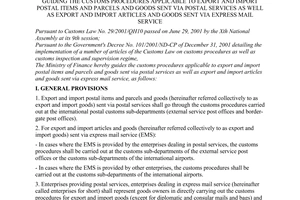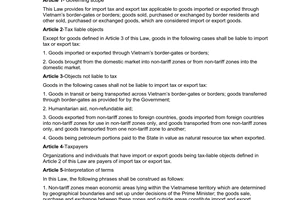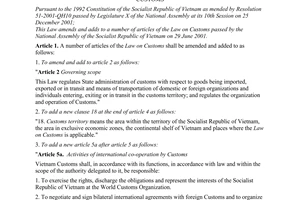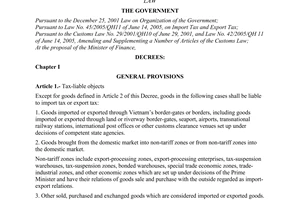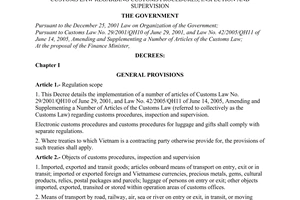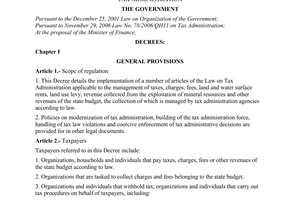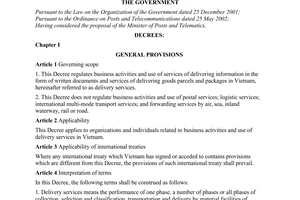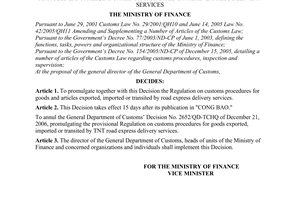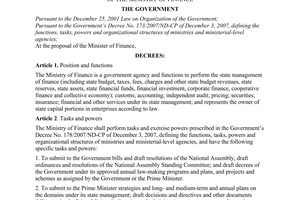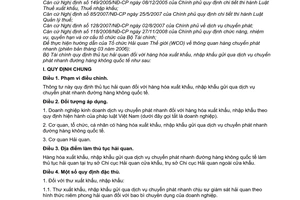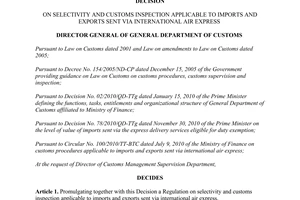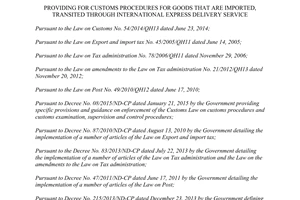Circular No. 100/2010/TT-BTC providing for customs procedures for imports đã được thay thế bởi Circular No. 191/2015/TT-BTC procedures goods imported transited through international express delivery và được áp dụng kể từ ngày 01/01/2016.
Nội dung toàn văn Circular No. 100/2010/TT-BTC providing for customs procedures for imports
|
THE
MINISTRY OF FINANCE |
SOCIALIST
REPUBLIC OF VIET NAM |
|
No. 100/2010/TT-BTC |
Hanoi, July 09, 2010 |
CIRCULAR
PROVIDING FOR CUSTOMS PROCEDURES FOR IMPORTS AND EXPORTS SENT VIA INTERNATIONAL AIR EXPRESS DELIVERY SERVICES
Pursuant to June 29, 2001
Customs Law No. 29/2001/QH10, and June 14. 2005 Law No. 42/ 2005/QH11 Amending
and Supplementing a Number of Articles of the Customs Law;
Pursuant to June 14, 2005 Law No. 45/2005/ QH11 on Import Duty and Export Duty;
Pursuant to November 29, 2006 Law No. 78/ 2006/QH11 on Tax Administration;
Pursuant to the Government's Decree No.
154/2005/ND-CP of December 15. 2005, detailing a number of articles of the
Customs Law regarding customs procedures and customs inspection and
supervision;
Pursuant to the Government's Decree No. 149/2005/ND-CP of December 8, 2005,
detailing the Law on Import Duty and Export Duty;
Pursuant to the Government's Decree No. 85/ 2007/ND-CP of May 25, 2007,
detailing the Law on Tax Administration;
Pursuant to the Government's Decree No. 128/2007/ND-CP of August 2, 2007, on
delivery services;
Pursuant to the Government's Decree No. 118/2008/ND-CP of November 27, 2008,
defining the functions, tasks, powers and organizational structure of the
Ministry of Finance;
In furtherance of the World Customs Organization (WCO) Guidelines on express
consignments clearance (the March 2006 version);
The Ministry of Finance provides for customs procedures for imports and exports
sent via international air express delivery services as follows:
I. GENERAL PROVISIONS
Article 1. Scope of regulation
This Circular provides for customs procedures for imports and exports sent via international air express delivery services.
Article 2. Subjects of application
1. Enterprises providing express delivery services for imports and exports under Vietnam's law (below referred to as enterprises).
2. Agencies, organizations and individuals having imports and exports sent via international air express delivery services. 3. Customs offices.
Article 3. Places for carrying out customs procedures
Customs procedures for imports and exports sent via international air express delivery services shall be carried out at border-gate or out-of-border gate Customs Departments.
Article 4. Specific provisions
1. For imported and exported mails:
1.1. Imported or exported mails sent via express delivery services are subject to customs supervision in the form of affixing customs seals on enterprises' special-use packings.
1.2. Imported or exported mails sent via express delivery services shall be supervised by competent state agencies through professional measures so as to ensure compliance with law.
2. For imported and exported diplomatic and consular bags:
2.1. When being imported or exported, diplomatic and consular bags are exempt from customs procedures (including exemption from customs declaration and customs inspection).
2.2. When there arc grounds to affirm that diplomatic or consular bags violate regulations on privileges and immunities, the General Director of Customs shall decide on the inspection and handling of these bags under Article 62 of the Customs Law.
3. Enterprises receiving exports and delivering imports:
3.1. Enterprises shall themselves receive exports from goods owners and deliver imports already cleared from customs procedures to goods owners. Places for earning out customs procedures for the export of goods and customs clearance for imports comply with Article 3 of this Circular.
3.2. In case goods are not permitted to be exported or imported and must be handled under law. enterprises shall, in pursuance to current regulations on the management of imports and exports and reasons notified by competent authorities, give explanations to goods owners.
4. For raw materials, auxiliary materials and supplies imported for urgent export processing or production, if the goods owner or enterprise concerned requests the import of goods under the regime applicable to non-commercial goods without tax refund, leaders of the district-level Customs Department shall settle the case at the goods owner's or enterprise's request and fully collect taxes (if any) before customs clearance of goods.
5. Grounds for customs offices and tax offices to effect tax refund or non-collection for goods sent via express delivery services which are eligible for tax refund include:
5.1. Customs dossiers;
5.2. The manifest of imports and exports, enclosed with the customs declaration, clearly indicating the category of goods and the name of the recipient (goods owner) which is the same as the name of the goods owner requesting lax refund or non-collection:
5.3 Document issued by the goods owner to authorize the express delivery service enterprise to carry out customs procedures.
6. After anticipating the time when goods will arrive at the place for carrying out customs procedures, enterprises shall register in advance with district-level Customs Departments the time for carrying out customs procedures for imports and exports (both in regular and unexpected cases).
Article 5. Channeling imports and exports and customs inspection
1. Imports and exports shall be channeled for customs inspection purposes in accordance with the WCO Guidelines on Express Consignments Clearance (the March 2006 version) and current regulations on the management of imports and exports and applicable tax policies.
2. On the basis of the channeling of imports and exports prescribed in Clause 1 of this Article, customs inspection of imports and exports shall be carried out in a simple and convenient manner, combining the application of risk management methods with the use of screening machines to physically inspect goods while ensuring strict state management and compliance with law.
3. The General Director of Customs shall provide in detail the channeling of imports and exports and customs inspection.
II. CUSTOMS PROCEDURES APPLICABLE TO IMPORTS AND EXPORS
Article 6. Pre-arrival of a shipment
1. Responsibilities of the enterprise:
1.1. To receive the goods manifest from the foreign partner and transfer it to the district-level Customs Department at least 2 hours (for long-haul flights of over 6 hours) or 1 hour (for short-haul flights of up to 6 hours) before goods arc transported to the place of carrying out customs procedures (not applicable to exports).
1.2. To channel goods under Article 5 of this Circular and guiding documents issued by the General Director of Customs.
1.3. To make customs declarations:
1.3.1. The customs declarant may be an enterprise, agency, organization or individual.
1.3.2. The enterprise shall, on behalf of the goods owner, directly carry out customs procedures for imports or exports (except for mails and diplomatic and consular bags) and implement policies on the management of imports and exports, policies on taxes, charges and other payable amounts, and perform the rights and obligations of the goods owner.
1.3.3. The enterprise shall make customs declarations for each goods lot transported to the place for carrying out customs procedures.
1.3.4. The enterprise shall make customs declarations based on the goods manifest (not applicable to exports) and documents accompanying the goods lot (if any).
a/ Customs declaration covers the channeling of goods under Point 1.2. Clause 1 of this Article.
b/ Customs declaration for duty-free goods shall be made according to the detailed list of duty-free imports or exports (according to form No. HQ 01-BKHCPN issued together with this Circular - nut printed herein).
- The detailed list of duty-free imports or exports is as valid as an ordinary customs declaration.
- Particularly for gifts and samples sent to Vietnam-based organizations of which the taxable value is under VND 5 million and the total payable tax amount is less than VND 50.000. it is not required to carry out procedures for tax exemption consideration. In this case, customs declaration and customs inspection will be the same as applicable to duty-free goods.
c/ For dutiable goods, goods subject to specialized management, state quality inspection, quarantine or food safety and hygiene inspection and baggage of persons on entry or exit, customs declaration shall be made separately on each customs declaration form for each goods lot.
d/ The enterprise shall take responsibility for the accuracy and consistency of declared contents.
1.3.5. In case goods owners wish to carry out customs procedures by themselves, they shall directly fill in the customs declaration.
1.3.6. In case goods owners request a separate declaration for their goods, the enterprise shall fill in a separate customs declaration.
1.3.7. The enterprise shall receive the district-level Customs Departments decision on to-be-modified contents of customs declaration (if any).
1.4. If carrying out e-customs procedures, the enterprise shall perform the following tasks through the computer network:
1.4.1. Tasks defined at Points 1.1.1.2 and 1.3. Clause 1 of this Article.
1.4.2. Sending the customs declaration to the district-level Customs Department.
2. Responsibilities of the district-level Customs Department:
2.1. To receive the goods manifest and the customs declaration from the enterprise.
2.2. On the basis of existing data and prescribed inspection criteria, to combine the risk management measure and other professional measures such as collecting information so as to study, analyze and inspect the customs declaration (including goods channeling) by the enterprise.
2.3. In case any content in the customs declaration needs to be modified, a customs officer shall (under the authorization of the leadership of the district-level Customs Department) immediately decide and notify the to-be-modified content to the enterprise for modification (the modification decision shall be recorded in the "notes-" column in form HQ 01-BKHCPN): the customs officer shall update modified contents of the customs declaration to the professional database under Point 2.2. Clause 2 of this Article.
2.4. In case no content of the customs declaration needs to be modified, the customs officer shall notify the enterprise of the district-level Customs Department's acceptance of the customs declaration.
2.5. In case of carrying out e-customs procedures, the district-level Customs Department shall perform tasks defined at Points 2.1. 2.2. 2.3 and 2.4. Clause 2 of this Article via the computer network.
Article 7. Upon arrival of a shipment
1. Responsibilities of the enterprise:
1.1. Based on the district-level Customs Department's decision on the contents of customs declaration, to channel the goods. Each package and parcel of imports shall be stuck with a color paper corresponding to its channel. The enterprise shall print and take responsibility for the management and use of these color papers.
The General Director of Customs shall specify color papers to be stuck on each goods package or parcel before the channeling of goods is completed.
1.2. To submit a customs dossier, comprising the following papers:
- The detailed list of duty-free imports/exports (for duty-free goods): 2 hard copies.
- The customs declaration: 2 originals (for goods other than duty-free goods).
- To submit and produce papers corresponding to each mode of import or export of goods prescribed in the Finance Ministry's Circular No. 79/2009/TT-BTC of April 20. 2009.
1.3. To produce goods subject to physical inspection to customs officers.
1.4. In case the enterprise cannot deliver imports to goods owners, before exporting these goods back to the country of origin, it shall produce these goods for re-inspection.
1.5. For goods which are mistakenly delivered (goods transported to a country other than the country of destination), the enterprise shall send to a written request for returning these goods to the country of origin (the country of exportation) or sending them to the country of destination indicated in the packings to the district-level Customs Department for approval.
2. Responsibilities of the district-level Customs Department:
2.1. To supervise the channeling of goods by the enterprise.
2.2. To carry out customs procedures:
The General Director of Customs shall specify customs procedures applicable to each channel of goods.
2.3. Customs officers shall re-inspect imports which have been cleared from customs procedures but cannot be delivered to goods owners before the enterprise exports them back to the country of origin.
2.4. In case goods are not qualified for export. the district-level Customs Department shall notify the reasons to the enterprise for the latter to return these goods to goods owners (particularly, goods banned from export must be handled according to current law).
2.5. To affix a customs seal on special-use packings containing or special-use vehicles carrying exports for which customs procedures have been completed for transportation to the border-gate of exportation.
2.6. To receive the enterprise's written request under Point 1.5, Clause 1 of this Article and permit the enterprise to return mistakenly delivered goods to the country of origin (country of exportation) or transfer them to the country of destination as indicated in the goods packings and conduct customs supervision in these cases.
2.7. To collect duties, taxes and fees under Section III of this Circular.
2.8. To settle overpaid duty, tax and fine amounts and assess duties and taxes under Section IV of this Circular.
III. PROCEDURES FOR COLLECTION AND PAYMENT OF DUTIES. TAXES AND CUSTOMS FEES
Article 8. Procedures for collection and payment of duties, taxes and customs fees
1. Responsibilities of the enterprise:
1.1. Every day. to declare, calculate and pay duties, taxes and fees for customs declarations with payable duty, tax and fee amounts for which customs procedures have been completed in the day.
1.2. The duty, tax and fee amounts payable in a day may be transferred via bank account, deducted from the tax guarantee amount or paid in cash.
1.3. In case the enterprise uses its own receipts:
1.3.1. The enterprise may issue its own receipts to customers by printing out from the computer receipts on duties and taxes on imports or exports and receipts of customs fees.
1.3.2. The printing, issuance, management and use of computerized tax receipts and fee receipts may comply with the Finance Ministry's regulations on the printing, issuance, management and use of tax prints.
1.3.3. Once every 5 working days, the enterprise shall collaborate with the district-level Customs Department in checking budget revenue collection and remittance documents so as to ensure that taxes and customs fees are collected strictly undercurrent regulations. If duties, taxes or fees are underpaid, the enterprise shall pay the deficit amounts. If they are overpaid, the overpaid amounts shall be settled under regulations.
1.4. In case the enterprise applies the method of multiple guarantee for payable tax amounts:
1.4.1. The enterprise shall send to the district- level Customs Department (at which it carries out customs procedures) a written request for the application of multiple guarantee for imports and exports under Articles 19 and 20 of the Finance Ministry's Circular No. 79/2009/TT-BTC of April 20, 2009. clearly stating the amount proposed for multiple guarantee and time of guarantee, under which the enterprise shall pay in advance a sum of money to the district-level Customs Department's account.
1.4.2. Once every 5 working days, the enterprise shall collaborate with the district-level Customs Department in finalizing the tax amount temporarily paid to the district-level Customs Department. If the tax amount is underpaid, the enterprise shall additionally pay the deficit amount. If it is overpaid, the overpaid amount shall be included in the lax amount to be temporarily paid for the subsequent week.
1.4.3. If. after making reconciliation in the monitoring book, the district-level Customs Department finds that the tax amount temporarily paid by the enterprise into the district-level Customs Department's deposit account is lower than the tax amount estimated to be payable in the week, the enterprise shall transfer the deficit amount and project the tax amount to be paid for the subsequent week into the district-level Customs Department's deposit account.
1.5. The total amount payable under tax receipts and fee receipts issued in a day by an enterprise must be equal to the total amount indicated in 1 tax receipt and 1 fee receipt issued by the district-level Customs Department for customs declarations with payable duty, tax and fee amounts for which customs procedures have been completed in the day (in case the enterprise pays in cash).
2. Responsibilities of the district-level Customs Department:
2.1. To determine the value of goods under current regulations on the taxable value of imports and exports, except for cases in which the value of goods is declared under regulations on channeling of imports and exports provided by the General Director of Customs and there are no doubts or signs of fraudulence.
2.2. To issue 1 receipt of duties and taxes on imports or exports and 1 receipt of customs fees for customs declarations with payable duty, tax and fee amounts for which customs procedures have been carried out in the day (in case enterprises pay duties, taxes and fees in cash), for cases in which duties and taxes are collected in cash or through advanced payment of a multiple guarantee for goods sent via express delivery services. Duty, tax and fee receipts issued by the district-level Customs Department to the enterprise shall be written with the total duty, tax and fee amount paid for 5 (five) working days and enclosed with a detailed list of duty and tax amounts paid for each lot of goods actually imported or exported in each day.
2.3. Once every 5 working days, the district-level Customs Department shall take the initiative in collaborating with the enterprise in checking budget revenue collection and payment receipts so as to ensure that duties, taxes and customs fees are collected strictly under the current regulations and finalize tax amounts temporarily paid to the district-level Customs Department (form No. HQ 03-BQTSTTTN issued together with this Circular - not printed herein).
IV SETTLEMENT OF OVERPAID DUTY TAX AND FINE AMOUNTS AND ASSESSMENT OF DUTIES AND TAXES
Article 9. Settlement of overpaid duty, tax and fine amounts:
1. Duties, taxes and fines of imports and exports sent via international air express delivery services shall be considered overpaid in the following cases:
1.1. Goods cannot be delivered to recipients and must be returned to their country of origin for which duties, taxes and fines (if any) have been paid;
1.2. Goods are duty-free or -exempt but. when carrying out customs procedures, enterprises declared them as dutiable and have actually paid duties, taxes and fines (if any);
1.3. Goods are determined as abandoned goods under Joint Circular No. 03/2004/TTLT-BBCVT-BTC of November 29. 2004. of the Ministry of Post and Telematics (now the Ministry of Information and Communications) and the Ministry of Finance guiding the handling of abandoned mails, postal matters and parcels for which duties, taxes and fines (if any ) have been paid.
Goods for which the paid tax amount is higher than the payable tax amount;
Goods eligible for tax refund according to law.
2. Dossiers, procedures and order for settling overpaid tax and fine amounts comply with Article 24 of the Finance Ministry's Circular No: 79/2009/TT-BTC of April 20.2009. Particularly, overpaid tax and fine amounts may be subtracted from the tax amount to be paid by enterprises on behalf of the goods owner for imports or exports at the subsequent importation or exportation.
Article 10. Assessment of duties and taxes
1. Enterprises shall, on behalf of goods owners, pay duty and tax amounts assessed for imports and exports.
2. Cases of assessment; procedures and order for assessment of duties and taxes comply with Article 23 of Circular No. 79/2009/TT-BTC.
V. CUSTOMS PROCEDURES FOR IMPORTS AND EXPORTS IN BORDER-GATE TRANSFER
Article 11. Provisions applicable to imports and exports in border-gate transfer
1. Exports in border-gate transfer are exports which have been already cleared from customs procedures and are transported from the district-level Customs Department at which export procedures are carried out to the Customs Department of the border gate of exportation for export.
2. Imports in border-gate transfer are imports which have not yet been cleared from customs procedures and are transported from the Customs Department of the border gate of importation (the place of arrival in Vietnam) to the district-level Customs Department at which import procedures are carried out.
3. Mistakenly delivered imports in border-gate transfer are goods which are transported from the district-level Customs Department of the place in which these goods are identified to the Customs Department of the locality of destination according to the recipient's address indicated on their packings.
4. Imports and exports in border-gate transfer must be transported along prescribed routes to designated places in strict accordance with the time schedule indicated in the customs dossier and subject to customs supervision in the form of customs sealing.
During transportation, imports and exports in border-gate transfer and customs seals must be preserved in their original conditions. Any accidents ox force majeure incidents occurring to these goods must be immediately notified to the customs offices and People's Committees of the nearest commune, ward or township for written certification.
Article 12. Customs procedures for imports and exports in border-gate transfer
1. Responsibilities of the district-level Customs Department which make transfer slips:
1.1. To make 2 slips on the transfer of imports or exports (according to form HQ 02-CCKCPN issued together with this Circular - not printed herein);
1.2. To transfer 2 transfer slips, together with the goods, to the enterprise for handing over to the district-level Customs Department which receives transfer slips.
2. Responsibilities of district-level Customs Departments which receive transfer slips:
To receive 2 transfer slips and the goods;
To give certification the 2 transfer slips as prescribed;
To keep 1 transfer slip and return the other (by fax) within 7 (seven) working days after receiving them to the district-level Customs Department which has made the transfer slip .
VI. HANDLING OF VIOLATIONS
Article 13. Handling of violations
All acts of violation of this Circular shall be handled according to current law.
VII. IMPLEMENTATION PROVISIONS
Article 14. Effect
1. This Circular takes effect 45 days from date of its signing.
2. To annul Circular No. 33/2003ATT-BTC of April 16, 2003. of the Ministry of Finance, guiding customs procedures for postal matters and parcels, imports and exports sent via postal services and articles, imports and exports sent via express delivery services. Decision No. 652/ TCHQ/QD/GSQL of April 27. 2005. of the General Department of Customs, providing for the pilot process of e-customs declaration and customs inspection of imports and exports sent via express delivery services, and Official Letter No. 1974/TCHQ-GSQL of April 15. 2009. of the General Department of Customs, on the pilot application of Point I. Section B of the Finance Ministry's Decision No. 93/2008/QD-BTC of October 29. 2008.
3. In the course of implementation, if documents mentioned in this Circular are modified, supplemented or replaced, the modified. supplemented or replaced documents shall prevail.
4. The General Director of Customs shall direct directors of provincial-level Customs Departments to manage and supervise the implementation of this Circular.
Provincial-level Customs Departments shall report any problems arising in the course of implementation of this Circular to the Ministry of Finance (the General Department of Customs) for consideration and settlement.-
|
|
FOR
THE MINISTER OF FINANCE |

